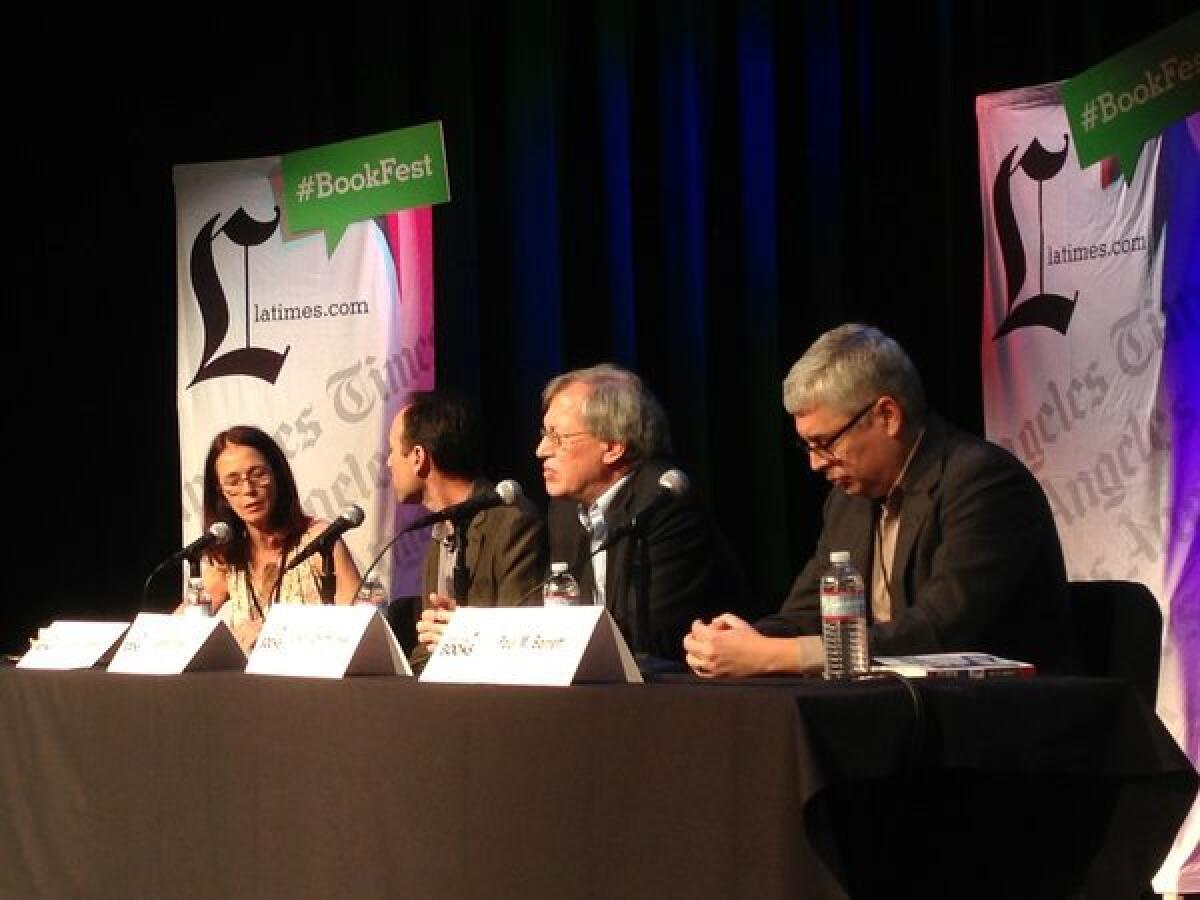Gun control laws from the Wild West (yes, they had them!) to now

Early on in the Sunday morning panel about “Guns in America,” author and UCLA constitutional law professor Adam Winkler held up his new book, “Gunfight: The Battle Over the Right to Bear Arms in America,” and opened it to an 1879 photograph of Dodge City, Kan., one of the most storied of the Wild West towns.
The photograph depicted a familiar scene of a dusty street and squared wooden facades. But there was also the unexpected: A sign warning that carrying a firearm in town was “strictly prohibited.”
“The Wild West towns like Tombstone (and Dodge City) had the most restrictive gun laws in the nation,” Winkler said. “That is an example of how our understanding and our mythologizing about guns really has created a lot of misconceptions and misunderstandings both of the nature of the right to bear arms and the history of gun control, and about American’s relationship with guns.”
FULL COVERAGE: FESTIVAL OF BOOKS
Context, as we know, is crucial for any sort of political discussion, and Winkler and two other authors of books about guns and gun control provided plenty of it to more than 300 people in the basement of the Ronald Tutor Campus Center at USC, the same room, coincidentally in which the late Rodney King spoke last year about his accidental role in the waves of violence that convulsed Los Angeles in 1992.
The consensus was that the fate of gun control is controlled by a small but dedicated minority of people, including the National Rifle Assn., which through its near single-minded focus on fighting gun restrictions has been able to produce far more influence on the political process than those who support gun control.
It could have been a depressingly timely subject, given the school shooting in Newtown, Conn., and the running gun battle last week between police and the presumed Boston Marathon bombers. But the panelists moved beyond the momentary arguments, with Erwin Chemerinsky, a constitutional scholar and founding dean of the UC Irvine law school, pointing out that of all the divisive political issues of the era, gun control is the only one rooted in the “enigmatic” phrasing of a constitutional right.
VIDEO: AUTHOR INTERVIEWS FROM FESTIVAL OF BOOKS
Despite polls that show wide support for many gun control measures, including the expansion of background checks that failed in the US. Senate last week, Chemerinsky said the NRA and its supporters have been able to exert their minority will.
“The question then to me becomes, how does the NRA come to have as much political power that it is in an absolute position to stop the Senate from adopting such an unobjectionable form of background checks,” said the author of “The Conservative Assault on the Constitution.”
Paul M. Barrett, assistant managing editor of Bloomberg Businessweek and author of “Glock: The Rise of America’s Gun,” argued that the current battles are rooted in political conservatism that began growing in the 1970s.
Winkler had earlier traced the rise of political conservatism and a near-libertarian view of gun laws within the NRA to a political coup that occurred during a 1977 national conference. As the leadership of the group was contemplating stepping back from politics and refocusing on the sporting nature of guns (from target shooting to hunting), he said, political conservatives descended on the meeting and wrested control of the group, redirecting it to the political theater.
To understand the NRA of today, Barrett argued, you have to understand the politics of the 1970s and 1980s, as urban violence exploded with the rise of crack cocaine and gangs, and the liberal response was to press for gun control. No matter how relatively modest proposals such as the expansion of background checks might seem, they are viewed by the gun-rights advocates “as the first step down the slippery slope” to seizing private guns, he said.
“That can be lampooned and ... has a paranoid overtone, but it’s not a lightly held view by millions of Americans,” Barrett said. “One of the reasons the gun debate seems to have tilted so far to the [right] ... is the inability of people on the other side of the argument to appreciate how deeply felt these fears are.”
As if to make the point, the last question from the audience was about whether the seizure of privately owned guns could make it easier to establish martial law, a question that was greeted with laugh in parts of the audience.
“While I don’t share those sentiments or anxieties, those sentiments and anxieties are held by a significant minority of the population,” Barrett said. “They are an element of the pro-gun movement that is very important to pay attention to.”
Scott Martelle is the author, most recently, of “Detroit: A Biography.”
More to Read
Sign up for our Book Club newsletter
Get the latest news, events and more from the Los Angeles Times Book Club, and help us get L.A. reading and talking.
You may occasionally receive promotional content from the Los Angeles Times.








